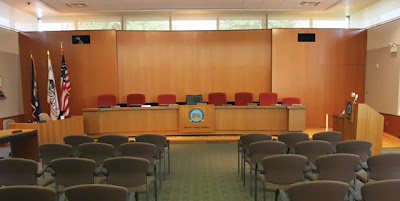On Tuesday evening, the
Taxpayers League of Minnesota hosted an informal end-of-session meet-and-greet in one of the tony paneled club rooms at the
Metropolitan in Golden Valley. (It was as close as I'll ever get to a smoke-filled room, thanks to the Minnesota Clean Air Act.)
The most common thing that people were saying about the legislative session now adjourned
sine die was, "It could have been worse." The best thing that people could say about the session was, "It's over." The take-away message from conservative legislators was, "Send us some help!"
Among the notable conservatives working the crowd were former gubernatorial endorsement candidate
Sue Jeffers, Hennepin County Commissioner candidate
Jeff Johnson, Pioneer Press columnist
Craig Westover, fellow
True North founders
Derek Brigham and
Brian Mason, Wright County Republican's Drew Emmer, and of course the lovely
Margaret Martin, co-host of the David Strom Show, heard Saturdays from 9:00-11:00 am on AM 1280 The Patriot.
The food and drink at 5:00 pm fooled everyone into staying for a wide-ranging recap of the session from some very hard-working, fiscally-conservative legislators at 6:00 pm. After consuming, as
Minnesota Free Market Institute president
David Strom put it, "Mike Wigley's wine" and the delish
D'Amico hors d'oeuvres, the aloha-shirted chairman of the Taxpayers League Wigley opened the program by introducing League president and former state Rep.
Phil Krinkie. Krinkie presented a special award to Rep.
Marty Seifert (R-Marshall): the Worst Friend of the Gorillas Award, for opposing state funding of the gorilla exhibit at the Como Park Zoo.
Seifert thanked the Taxpayers League for their work, and explained that sustaining Gov.
Tim Pawlenty's (R-MN) vetoes is only possible because the DFL is five votes short of a veto-proof majority in the House. He said end-of-session negotiations with the majority party leaders, notably Sen.
Larry Pogemiller (DFL-Minneapolis), were particularly brutal this year.
Several legislators provided a recap of the session in their areas of expertise.
Sen.
Geoff Michel (R-Edina) and Sen.
David Hann (R-Eden Prairie) represented Minnesota's conservative state senators. Michel reported that 80% of the state budget reserve ("rainy day" fund) was used to balance the biennial budget, in spite of the expected November budget forecast of a $2-$3 billion deficit. Although state law requires a balanced budget, conservatives would prefer cuts in spending to depleting the reserve.
Krinkie presented Rep.
Mark Buesgens (R-Jordan) with the Best Amendment Award for his amendment that would have renamed the "per diem" payment to legislators as "Walking Around Money." Longtime education reform stalwart and teacher Buesgens described the "one-time" $51 per-student grant to schools that passed this session, which will enable the DFL to claim a Republican funding "cut" if not appropriated next session. Buesgens also made the point that true reform (in the form of vouchers) is the only way to improve how education is delivered in Minnesota, rather than simply throwing more money at the current system.
Assistant Minority Whip and lead Republican on the Health and Human Services Finance Committee Rep.
Matt Dean (R-Dellwood), praised the defeat of Education Minnesota's socialized medicine for teachers plan, although thousands more Minnesotans now qualify for state welfare health plans due to a raising of the maximum qualifying income. He also recommended Pat Shortridge's recent article on National Review Online,
"Yes we can," on rebuilding the conservative movement in this country.
Rep.
Mary Liz Holberg (R-Lakeville) received the Most Likely To Be Run Over By A Light Rail Train Award, because she is always standing in the way of light rail spending (and gas tax increases)!
Rep.
Paul Khols (R-Victoria) sounded like the Son of Dr. No (former Rep. Krinkie) when he said that "no" can be a good word when voting against tax increases. He explained that the DFL was promoting
twenty-five tax increases this session alone that would have cost taxpayers $10 billion in new taxes. The $6+ billion tax increase in the transportation bill was bad enough!
Rep.
Tom Hackbarth (R-Cedar) explained how political horse-trading perverted the proposed constitutional amendment to dedicate a one-eighth percent of the
existing state sales taxes to preserving hunting and fishing into a three-eighths percent sales tax
increase to promote radical environmentalism, the arts, and parks, in addition to the original outdoors programs. He warned that special interest groups will be promoting the constitutional amendment, and that its passage would open the door to millions of dollars of grants to those groups (as the Minnesota State Lottery already does to environmental groups).
Strom concluded the program with a fundraising pitch, reminding the group that legislators and the Taxpayers League cannot do it alone. The big tip jar at the door was filled to the top with tens and twenties, a good sign, and contribution envelopes were also distributed with the League's popular lawn signs and "wanted" poster, and a session scrapbook of editorials and Krinkie op-eds. The evening's co-sponsor,
AM 1280 The Patriot, also had a table with information and bumper stickers.
Conservatives need to remind the electorate that higher quality of life does not mean ever-larger government, in fact, the opposite is true. As
Margaret Thatcher was quoted during the event, "First you win the argument, then you win the vote." If conservatives fail to win the argument and get like-minded candidates elected to the Minnesota House this fall, the 2008 tax-and-spend session will only be another step in our long march to the
"cold Detroit" of even higher taxes and an accelerated taxpayer and business exodus from the Land of 10,000 Taxes.








 The
The 

